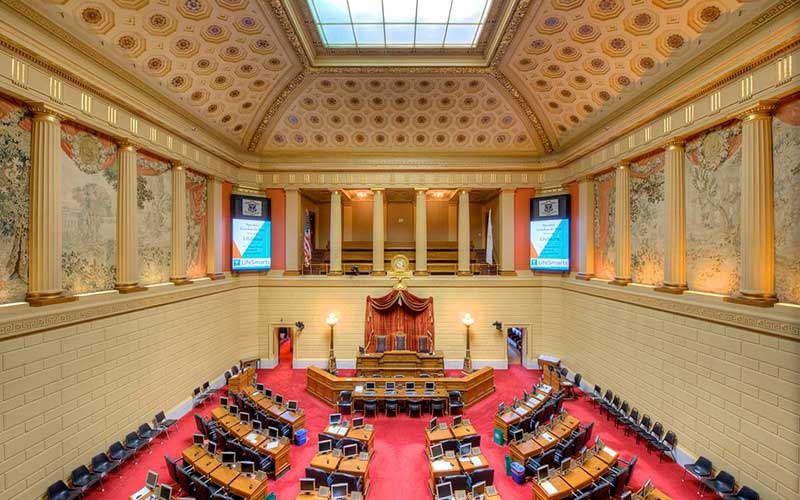
When the Rhode Island General Assembly Reconvenes in January, we'll be looking for progress on electric vehicles and farm-based renewable energy projects. Photo: Bestbudbrian via CC 3.0
With the Rhode Island General Assembly on hiatus until January, we’re reviewing progress made on key bills this past year – and highlight bills that we will be pushing forward when the Assembly reconvenes in the new year.
In this blog, we’ll talk about bills related to energy. You can find our round-up of food- and water-related legislation here.
On-Farm Renewable Energy
This legislative session found the Assembly focused on two bills related to the development of renewable-energy projects on farms and other undeveloped lands.
H-6062, sponsored by Representative Teresa Tanzi, was a broad bill that would have allowed renewable energy projects on certain farms, stopping cities and towns from restricting these projects with local zoning laws.
We were at the table early with renewable-energy developers and partners Audubon Society of Rhode Island and Rhode Island Land Trust Council. Together, we crafted a compromise bill that preserved farmland for future use while also encouraging appropriately scaled renewable energy projects. After all, these sorts of renewable energy projects don’t just help Rhode Island meet its climate goals and transition to a clean-energy future; they also give farmers an additional revenue stream.
In the end, there was too much division over the bill, and it did not pass. We’re already back at the table now, however, getting ready for these same issues to arise next session.
A related bill, S-570 sponsored by Senator Sue Sosnowski, did pass this year. It is much narrower than the bill discussed above, not going so far as to preempt zoning laws or establish siting standards, but still helping to lay the groundwork for some of the principles we want to see in a broader bill next year. This bill changed the way land is taxed when it is converted from a farm, forest, and open space to renewable energy projects.
In the end, the bill essentially provides an incentive for certain types of on-farm renewable energy projects: ones that allow the land under and around the project to be used for farming and ones that convert 20% or less of the farmland to renewable energy generation, leaving at least 80% of the land in farming.
Again working with the Audubon Society and the Land Trust Council, CLF coordinated with a broad coalition and drafted parts of the final bill. We are optimistic that the dual-use and limited-footprint concepts featured in this bill will be carried over into next session as the General Assembly again considers the broader issues posed by siting renewable energy projects on farms and other undeveloped lands.
Electric Vehicles
Getting more electric cars and trucks on the road is a critical step if Rhode Island is to meet its goals for cutting greenhouse gas emissions in the state. That’s why CLF supported Governor Raimondo’s Budget Article 19, which would have created and funded an electric vehicle rebate program. As we’ve discussed in our report, Charging Up, such a program is the best way to boost electric car sales.
Unfortunately, Budget Article 19 was lost in budget negotiations with the House. As a result, the state had to pause its existing, temporary rebate program in July – a major loss for a state that could, and should, be a national leader on this important issue. CLF stands ready to work with our partners for a better outcome next session. In the meantime, we’ve joined partners in urging Attorney General Kilmartin to direct Volkswagen settlement funds toward restarting the program.
Boosting Renewable Energy
Back in 2014, Rhode Island enacted a major new law designed specifically to jump-start the creation of local renewable energy jobs in Rhode Island. CLF was honored to be asked by the General Assembly leadership to help draft that bill.
At the time, the Renewable Energy Growth program received unusually broad support, including from the environmental community, renewable energy developers, and Rhode Island’s dominant utility, National Grid. In its first three years, the program has been such a resounding success that in 2017 the General Assembly extended the program by an additional 10 years, until 2029, adding 40 MW of new renewable projects per year for a total of 400 MW. This extension was a huge win for clean energy, reducing carbon emissions, and creating local jobs.
Keeping Utility Profits Decoupled from Consumption
Decoupling separates utility profits from the amount of energy we all consume. When utility profits aren’t decoupled from consumption, it creates a disincentive for them to provide energy efficiency programs (these programs reduce how much electricity we all use, benefitting the environment and our wallets). That’s why CLF has long supported decoupling throughout New England. This year, we were part of a broader coalition in that successfully defeated a bill (S-876; H-6188) that would have undermined decoupling in Rhode Island. CLF also successfully advocated against a companion bill (S-632; H-5640) that would have limited funds available for energy efficiency programs.
Stopping Invenergy
Unfortunately, a bill (H-5897; S-756) that could have stopped the Invenergy power plant failed in the General Assembly, despite broad support from CLF and the broader environmental community. Of course, CLF’s litigation in the Superior Court and in the state’s Energy Facilities Siting Board to stop Invenergy continues.
Thanks to all of you who called, wrote, and emailed your legislators to support our legislative work this past year. Your voice makes a difference and we’ll be calling on you again in the year ahead as we move this work forward.



